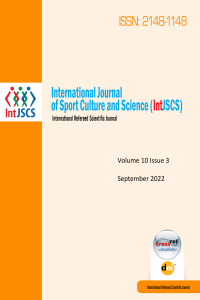Abstract
The purpose of this study is to investigate the leadership styles of coaches. The aim is to determine the leadership styles of the coaches working in different branches, how the leadership styles are in line with the opinions of the athletes, whether there are differences between the branches and to offer solutions. The universe of the research; The coaches working in Turkey and the athletes working in these teams constitute the sample; trainers and athletes working in selected branches. A questionnaire was applied to approximately 240 athletes, and the leadership styles of the coaches working in their teams were questioned. In the research, besides the “Personal Information Form”, the “Leadership Scale for Sports” consisting of 40 items, developed by Chelladurai and Saleh, was used to obtain information about the athletes themselves. After the research data were obtained, the data were analyzed by calculating the frequency, frequency (f) and percent (%) of the demographic characteristics of the athletes using the SPSS statistical package program. The results of the study showed that the athletes from different departments participating in the study did not differ in educational support, social support and autocratic subscales. However, there is a significant difference between the mean scores of the democratic and positive feedback subscales.
Keywords
References
- Alpar R. (2001). Spor Bilimlerinde Uygulamalı İstatistik, Nobel Yayın Dağıtım, Ankara.
- Chelladurai P., Saleh, S.D. (1980). Dimensins Of LeaderBehavior İn Sports: Development Of A LeadershipScale. Journal Of SportPsychology, P.34-45.9
- Çalışkan, G. (2001). Liderlik Açısından Antrenör Davranışlarının Sporcu Performansı Üzerine Etkisinin Değerlendirilmesi, (Yüksek Lisans Tezi), Dumlupınar Üniversitesi Sosyal Bilimler Enstitüsü, Kütahya.
- Donuk, B. (2006). Türkiye Profesyonel Futbol Ligleri Antrenörlerinin Liderlik Tarzlarının İncelenmesi ve Bir Model Yaklaşım, (Doktora Tezi), Marmara Üniversitesi Sağlık Bilimleri Enstitüsü, İstanbul.
- Genç, D.A. (1998). Spor Hukuku, Alfa Yayınları, İstanbul.
- Güngörmüş Ah. Gürbüz B.Yenel F. (2006 ). Spor İçin Liderlik Ölçeğinin Sporcuların Antrenörün Davranışlarını Algılaması Versiyonunun Psikometrik Özelliklerinin Değerlendirilmesi, 9.Uluslararası Spor Bilimleri Kongresi,1043, Muğla.
- Karasar. N. (2015). Bilimsel Araştırma Yöntemi, Nobel Akademik Yayıncılık, Ankara.
- Köksal, F. (2008). Antrenörlerin Liderlik Tarzları ile Öz Yeterlikler Arasındaki İlişki, (Yüksek Lisans Tezi) Selçuk Üniversitesi, Sağlık Bilimleri Enstitüsü, Konya.
- NacarE. (2013). A Study on LeadershipStyles of Coaches of theTurkish Professional Handball First League” AustralianJournal of Basic andAppliedSciences, 7(2): 612-617.
- Nacar E, Gacar A. (2013).Theİnvestigation Of TheRelationShipBetweenTheCoachAnd Team MatesAndTheUnity Of The Team İn Volleyball” Advances in EnvironmentalBiology, 7(2):223-228.
- Serin, K. (2016). Antrenörlerinin Liderlik Tarzlarının Belirlenmesi, (Yüksek Lisans Tezi), Selçuk Üniversitesi Sağlık Bilimleri Enstitüsü Boks, Konya.
- Weinberg R, Gould D. (1995). Foundations of SportAndExercisePsychology. Human Kinetics. Illions.
Abstract
References
- Alpar R. (2001). Spor Bilimlerinde Uygulamalı İstatistik, Nobel Yayın Dağıtım, Ankara.
- Chelladurai P., Saleh, S.D. (1980). Dimensins Of LeaderBehavior İn Sports: Development Of A LeadershipScale. Journal Of SportPsychology, P.34-45.9
- Çalışkan, G. (2001). Liderlik Açısından Antrenör Davranışlarının Sporcu Performansı Üzerine Etkisinin Değerlendirilmesi, (Yüksek Lisans Tezi), Dumlupınar Üniversitesi Sosyal Bilimler Enstitüsü, Kütahya.
- Donuk, B. (2006). Türkiye Profesyonel Futbol Ligleri Antrenörlerinin Liderlik Tarzlarının İncelenmesi ve Bir Model Yaklaşım, (Doktora Tezi), Marmara Üniversitesi Sağlık Bilimleri Enstitüsü, İstanbul.
- Genç, D.A. (1998). Spor Hukuku, Alfa Yayınları, İstanbul.
- Güngörmüş Ah. Gürbüz B.Yenel F. (2006 ). Spor İçin Liderlik Ölçeğinin Sporcuların Antrenörün Davranışlarını Algılaması Versiyonunun Psikometrik Özelliklerinin Değerlendirilmesi, 9.Uluslararası Spor Bilimleri Kongresi,1043, Muğla.
- Karasar. N. (2015). Bilimsel Araştırma Yöntemi, Nobel Akademik Yayıncılık, Ankara.
- Köksal, F. (2008). Antrenörlerin Liderlik Tarzları ile Öz Yeterlikler Arasındaki İlişki, (Yüksek Lisans Tezi) Selçuk Üniversitesi, Sağlık Bilimleri Enstitüsü, Konya.
- NacarE. (2013). A Study on LeadershipStyles of Coaches of theTurkish Professional Handball First League” AustralianJournal of Basic andAppliedSciences, 7(2): 612-617.
- Nacar E, Gacar A. (2013).Theİnvestigation Of TheRelationShipBetweenTheCoachAnd Team MatesAndTheUnity Of The Team İn Volleyball” Advances in EnvironmentalBiology, 7(2):223-228.
- Serin, K. (2016). Antrenörlerinin Liderlik Tarzlarının Belirlenmesi, (Yüksek Lisans Tezi), Selçuk Üniversitesi Sağlık Bilimleri Enstitüsü Boks, Konya.
- Weinberg R, Gould D. (1995). Foundations of SportAndExercisePsychology. Human Kinetics. Illions.
Details
| Primary Language | English |
|---|---|
| Subjects | Sports Medicine |
| Journal Section | Articles |
| Authors | |
| Publication Date | October 10, 2022 |
| Published in Issue | Year 2022 Volume: 10 Issue: 3 |

